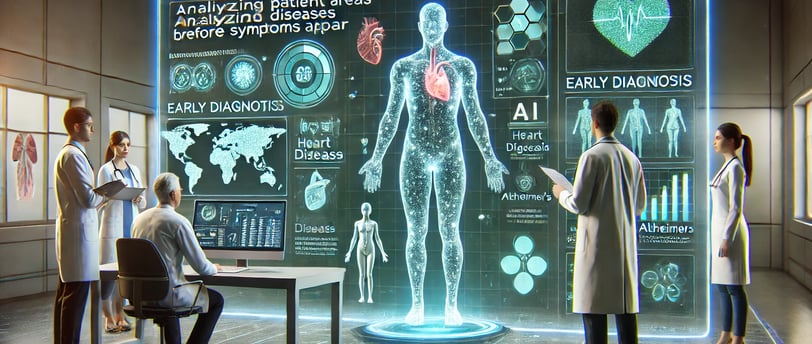AI in Healthcare: How Artificial Intelligence Can Predict Diseases Before Symptoms Appear
Discover how AI is transforming healthcare by predicting diseases like cancer, heart disease, and Alzheimer's years before symptoms appear. Learn about groundbreaking AI models, real-world applications, and the ethical dilemmas surrounding predictive healthcare. Is AI the future of early disease detection? Find out in this in-depth analysis!


Artificial Intelligence (AI) is making remarkable strides in medicine, and one of its most astonishing capabilities is predicting diseases long before symptoms appear. Imagine a future where doctors can tell you years in advance that you're at risk for cancer, Alzheimer's, or heart disease—and even guide you in preventing it. This is no longer science fiction; AI-driven predictive healthcare is becoming a reality.
How AI Predicts Diseases Before Symptoms Show
Predictive AI in healthcare works by analyzing enormous datasets, including medical records, genetic information, lifestyle choices, and environmental factors. Machine learning models can detect patterns in this data that human doctors might miss, offering insights into disease development before any physical signs appear.
Key Technologies Powering Predictive AI in Healthcare
🔹 Machine Learning & Deep Learning: AI models analyze vast amounts of medical data, learning to identify early warning signs of diseases. 🔹 Genomic Analysis: AI studies DNA sequences to predict genetic predispositions to conditions like cancer and neurodegenerative diseases. 🔹 Wearable Tech & IoT Devices: AI processes real-time health data from smartwatches, fitness trackers, and biosensors to detect anomalies. 🔹 Big Data Integration: AI combines hospital records, past diagnoses, and lab results to make highly accurate predictions.
Real-World AI Models That Predict Diseases
AI is already saving lives by predicting diseases before they manifest. Here are some cutting-edge developments:
1. AI in Cancer Detection 🎗️
🔹 Google’s DeepMind developed an AI system that detects breast cancer better than human radiologists, reducing false positives and false negatives.
🔹 Tempus AI analyzes genetic and molecular data to forecast cancer risks and recommend personalized treatments.
🚀 Impact: Early cancer detection could prevent millions of deaths every year by enabling timely interventions.
2. AI & Heart Disease Prediction ❤️
🔹 Apple Watch & Cardiogram AI can detect atrial fibrillation before users experience symptoms, helping prevent strokes.
🔹 MIT’s AI models analyze ECG readings to predict heart disease risk with 90% accuracy.
🚀 Impact: AI-powered screening could dramatically reduce heart attacks and strokes, the leading causes of death globally.
3. AI & Alzheimer’s Early Detection 🧠
🔹 IBM’s AI model analyzes speech patterns and cognitive function to predict Alzheimer’s years before diagnosis. 🔹 AI-powered brain scans detect signs of neurodegeneration in early stages, allowing preventive treatments.
🚀 Impact: Predicting Alzheimer’s early could lead to new therapies that slow down or even prevent cognitive decline.
The Ethical Dilemma: Should AI Predict Our Health?
While AI-powered disease prediction is groundbreaking, it raises ethical questions:
🔹 Privacy Risks: Should AI have access to our entire medical history?
🔹 Psychological Impact: Would you want to know if you’ll develop a fatal disease decade in advance?
🔹 Healthcare Inequality: Will AI-driven diagnostics be available to everyone, or only to those who can afford it?
Final Thoughts: AI Is Changing Medicine Forever
AI’s ability to predict diseases before symptoms appear is nothing short of revolutionary. By identifying risks early, it has the potential to prevent suffering, reduce healthcare costs, and extend lifespans. However, ethical concerns must be addressed to ensure AI benefits everyone.
📢 If you found this article insightful, share it with others and subscribe for more AI-powered healthcare updates! 🚀
